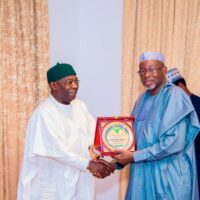Addressing problems of potable water supply in Enugu through legislation
Addressing problems of potable water supply in Enugu through legislation
Tuesday, May 20, 2014 4:24 pm
By Emmanuel Acha, News Agency of Nigeria (NAN)
Gov. Sullivan Chime of Enugu State recently assented to the amended Enugu Water and Sanitation Law, a principal law of Enugu State Water Corporation.
The amended law was enacted by the assembly on Oct. 2, 2012.
The law, designed to regulate activities in the water sector, as well as boost water supply, prescribes charges for operating private water works for domestic or commercial purpose.
The law also “empowers any person or group of persons to take water from any water course or any other underground water by way of application to the Commissioner for Water Resources for the grant of a license.“
The law also prescribes charges for producers of sachet and bottled water, industrial water users, commercial boreholes operators, among others.
Under the law, producers of sachet water are to register with N10,000 and annual renewal fee of N5,000; N20,000 registration for bottled water producers and N10,000 annual renewal fee.
License for commercial boreholes attracts a fee of N35,000, and annual renewal fee of N25,000; while license for industrial water boreholes is N30,000, with an annual renewal fee of N20,000.
Mr Michael Nwachukwu, Enugu State Commissioner for Water Resources, said the law was designed to regulate activities in the water sector.
Nwachukwu made the clarification in Enugu at a sensitisation workshop for stakeholders in the water sector
“By the dictates of this law, no individual or group either for commercial or domestic purposes has the right to utilise state resources, in this case, water, without a legitimate license.
“We are now poised like never before to ensure that potable water gets to every citizen of this state, under sanitary conditions,” he said.
The commissioner said that the government had along with some donor agencies initiated measures to tackle the water challenge headlong.
“Our facilities were run down previous years and the current administration had tried to fix such facilities and that is why there had been an improvement on supply in recent times.
“We try to ration supply of water and that is why some areas get water twice weekly, while others may get less,“ he said.
Mr Charlse Eze, Permanent Secretary of the ministry, said that out of the 3.3 million people in the state, only about 37.8 per cent of all households have access to safe potable water.
“Only 38.9 per cent of the households have access to a good means of sanitary disposal,” he added.
Mrs Janet Ngene, Executive Director, Community Health Initiative Nigeria, stressed that sanitation should be taken as the entry point of providing potable water to the people.
“If we have boreholes and they are standing on areas that are badly polluted with people practicing open defecation, we cannot have good source of potable water in the state.
“Water is life, sanitation is humanity and open defecation is an enemy to life because we are poisoning the environment. Government should, therefore, conduct random checks on sources of drinking water to determine their hygienic conditions,” Ngene said.
Mr Blessed Okonkwo, Chairman, Table Water Producers Association of Nigeria, Enugu State chapter, said government’s policies were hindering provision of potable water.
He appealed to the government to address the issue of multiple taxation on its members.
Okonkwo said that members of the association had long grappled with the issue of taxation, adding that such had eroded their profitability.
The chairman said that multiple taxes were levied on them by both the state and local governments and urged the government to streamline such charges to make the business climate conducive.
Okonkwo listed the levies charged by the state government annually to include ESWAMA N48,000, vehicle permits N9,000, NESREA N115,000, effluent N30,000 and development levy N30,000.
Others are fumigation N30,000 (quarterly) and business premises, N150,000.
He listed the levies charged by the local government authorities as factory permit N6,000, and development levy N6,000 while the Standards Organisation of Nigeria charged N10,000 quarterly.
“We want to cooperate with the state government because the governor is doing well and as responsible citizens, we need to discharge our civic obligations.
“But we appeal to the government to streamline these charges and give us one single receipt for these charges,” he said.
He said the state government had done well in supporting small and medium industries, noting that it would be counter-productive if such levies persisted.
Mr Saaondo Anom, a representative of UNICEF, Enugu Office, said that the legislation was a major step towards a sustainable water resources management.
“I am happy this law ensures that every water source is registered, and I want government to implement this aspect of the law which has a very big implication in the management of water resources.
“Surface and ground water are exhaustible and it is very important to know how we utilise same.
“We need to know how much water we are abstracting, either underground or on the surface.
“In 2008, the government of India bought-over boreholes from farmers who were irrigating their rice fields.
“The ground level water was going down progressively and government decided to manage the crisis by buying over the boreholes in order not to destroy the ground-water aquifer,” he said.
Stakeholders want the government to ensure the enforcement of the legislation, but to streamline taxation in the water sector. (NANFeatures)

 1 hour ago
1 hour ago  5 hours ago
5 hours ago  5 hours ago
5 hours ago  6 hours ago
6 hours ago  7 hours ago
7 hours ago  7 hours ago
7 hours ago  8 hours ago
8 hours ago  9 hours ago
9 hours ago
Join The Conversation